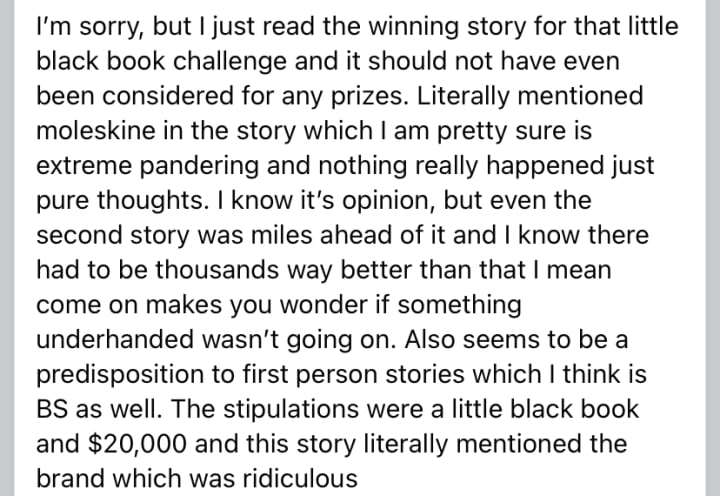The Delicate Art of Constructive Criticism
5 Tips for Crafting Effective and Helpful Criticism

A month ago, I read a story by another Vocal Creator entitled All Writers Are Mean. The writer expressed her frustration with the quality of criticism launched against a fellow creator after a win in a Vocal challenge. It was brutal. The grand prize was $2,500, and some creators were nitpicking and tearing apart the winner’s work. The writer concluded that the writing space is mired in jealousy, envy and meanness. I've said as much in an article I published a while ago. Tucked away in the back of my mind, I didn't revisit this story until the completion of the Little Black Book challenge a few weeks ago.
The aftermath of that challenge, which was valued at a whopping $20,000, was fascinating. It got weirdly personal. Here are a few of the criticisms of the winner that stood out to me:





After sifting through all of the commentaries on the LBB challenge winner, I've altered my position on envy in the writing space. I still largely believe that we are creatures of immense emotional capacity, and when overwhelmed with negative feelings, the centre in our brain that specializes in 'stupid' jumps to the fore. However, I'm also of the opinion that much of our propensity for giving unwelcome criticism stems from our inability to differentiate between constructive and destructive criticism. The distinction between the two is subtle, but the results of choosing one critical path over the other are immeasurable. Constructive criticism builds; destructive criticism destroys. If and when you get the urge to lay waste to another creator's hard work, please consider the following five tips before speaking (or typing).
1. Critique the Work, Not The Creator
The minute you start lobbing insults at another person, you're fighting a losing battle. While you're meant to be analyzing the literary merit of a piece of writing, you're wasting time commenting on its writer's financial background, race and worthiness. In the meantime, there's writing that's just sitting there unattended to. This seems like a fairly obvious tip but limit your critiques of another creator's work to their work. You know nothing about them as a person, and while it's all too easy to lower the tone of the conversation and devolve into rants and raves about the writer, it's best to avoid this. It serves no one.
2. Criticize The Piece for What It's Doing, Not What You Wish It Would Do
This bit of advice seems weird but bear with me as I attempt to explain. The toughest grader I've ever had in university was a professor in a second-year Political Science course. She would always request that we provide critiques of the academic articles we were forced to read in our analyses. Whenever she set this task, the easiest path to take was "I wish the article had said this" or "I wish the author had done this instead." Responses like these were more likely than not met with ire and a barely passing grade. When we'd complain, the professor would say something to the effect of: "You're wishing upon a star, that's lazy. Critique the article for what it's doing, not what you think it should do."
This response always irritated me, but after taking three classes with this professor, I finally understand her meaning. It is lazy. Because rather than identifying why a specific part of a story does not work within the context of the narrative, you are reaching beyond the story's boundaries for an external meaning that the author likely didn't intend to convey. In reality, you're not meaningfully engaging with the material the author has laid before you. Constructive criticism requires that you deeply examine the work presented to you and provide feedback based principally on the contents of this work.
3. Give Criticism That Is Actionable
"This is not creative" is not constructive criticism.
"This is boring" is not constructive criticism.
"I hate this so much" is not constructive criticism.
Why? Constructive criticism is commentary that incentivizes change and improvement. Simply expressing your disapproval for a piece of writing does little to change the composition of the writing or help the creator to improve their skills overall. You're just voicing your own negative opinion at that point, which is great but also useless. In the same way that every single word counts when crafting a good story, so too does the value of your criticism count. For this reason, it's crucial to highlight parts of a person's writing that they can actually change. Endeavour to share actionable criticism that writers can actively use to boost the effectiveness of their writing. My thought process in crafting constructive criticism is the same as when I get the urge to comment on another person's physical appearance: can this person realistically make this change in the next ten minutes? Does my criticism revolve around something within their sphere of control? Centre your critiques with this knowledge in mind and resist the urge to lodge the odd "you're a terrible writer" complaint at another creator.
4. Be Specific about Your Complaints
Be clear about what you mean. I spoke at length about this in my story about the time I got into an argument with an internet stranger, but it bears repeating. People don't read. Or, they do read, and they misconstrue your intentions based on their own perceptions. Be very precise with the language that you use when criticizing the work of another person. I'm not a mind reader, and it's likely that you aren't either, so saying something vague like "this is confusing" is confusing. The word 'this' is ambiguous. Are you referring to the body of work at large or a small subsection of it? Is the qualifier 'confusing' referring to the plot, the cast of characters or the descriptions of the setting? Is the dialogue confusing? I don't know because you didn't tell me! As far as possible, be specific about your quarrel with a particular piece of writing. It shines such a brilliant light on the path to improvement.
5. Acknowledge Differing Positionalities
Positionality is my new favourite word. I use it to describe everything now. Positionality describes the context and environment that shape our various worldviews and craft our biases. These contexts include socio-economic background, race, gender, ethnicity, religion, among other things that condition our experiences and influence our consumption of particular content. Our positionality explains why two individuals can undergo the same experience and have vastly different opinions. It also problematizes qualifiers such a 'good' and 'bad', 'pretty' and 'ugly', 'kind' and 'rude'. All of that is my long-winded way of saying that everything depends. Writing depends. Reading depends. It all depends. Nothing is objectively good or bad. You can always find someone somewhere who will disagree with you. Understand that your criticisms (even when they are constructive) are shaped by your personal preferences that may differ drastically from other people. You are not an overarching authority on good writing, and neither is anyone else.
---
Ok, I think that's it from me. I could go on and on about the importance of framing our critiques through a constructive lens, but I won't hold you hostage any longer. My inspiration for writing this story was the overwhelming disappointment, anger and sadness that I felt reading some of the comments on the LBB challenge winner's Instagram. I don't know her, and she doesn't know me either, but the character assassination and personal takedown that she experienced shouldn't be the norm on this or any other writing platform. You shouldn't get eviscerated for simply sharing your views and extending a sense of vulnerability through writing. This website is called Vocal, for crying out loud!
---------------------------------------------------
If you liked this post, please be sure to like this post! If you're able to leave a small tip, it'd be greatly appreciated and also, feel free to check out some of my latest stories. I recommend starting with this one:
About the Creator
Laquesha Bailey
22 years old literally, about 87 at heart. I write about self care, university life, money, music, books and whatever else that piques my interest.
@laqueshabailey






Comments
There are no comments for this story
Be the first to respond and start the conversation.